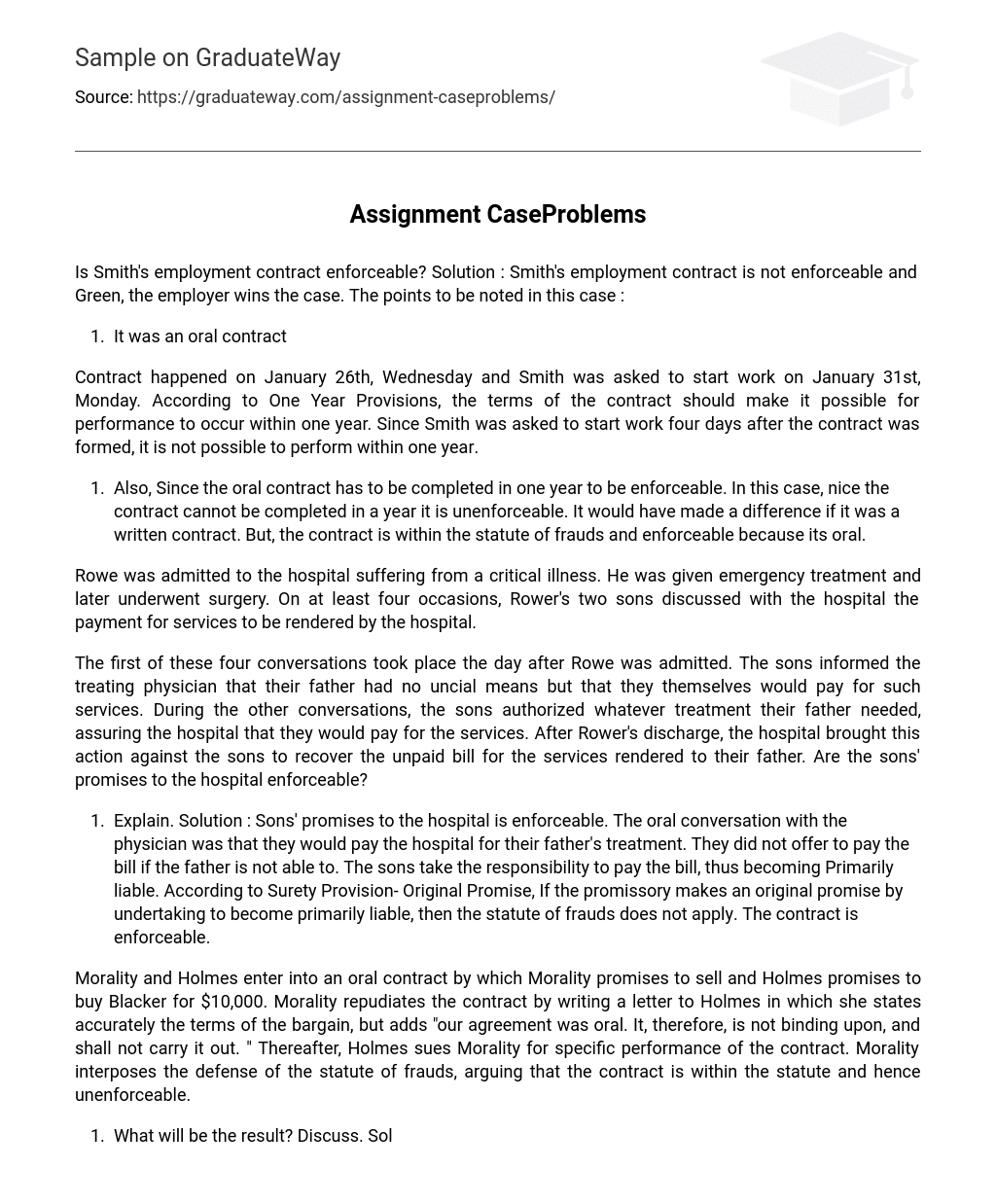Is Smith’s employment contract enforceable? According to the solution, Smith’s employment contract is deemed unenforceable and thus, Green, the employer, emerges as the victor in this case. The key points to be considered in this matter are as follows:
- It was an oral contract
Contract occurred on January 26th, Wednesday, and Smith was instructed to begin work on January 31st, Monday. As per the One Year Provisions, the contract terms must allow for completion within one year. Since Smith was directed to start work four days after the contract was made, it becomes impractical to meet the one-year performance requirement.
- Also, Since the oral contract has to be completed in one year to be enforceable. In this case, nice the contract cannot be completed in a year it is unenforceable. It would have made a difference if it was a written contract. But, the contract is within the statute of frauds and enforceable because its oral.
Rowe was admitted to the hospital due to a severe illness. He received immediate medical care and eventually had an operation. Rower’s two sons had multiple conversations with the hospital regarding payment for the services they were going to provide.
The hospital had four conversations with the sons regarding their father’s treatment. The first conversation occurred the day after Rowe was admitted. During this conversation, the sons informed the treating physician that their father had no means to pay for the services, but they themselves would cover the costs. In the subsequent conversations, the sons gave authorization for any necessary treatment and assured the hospital that they would be responsible for payment. After Rowe was discharged, the hospital filed a lawsuit against the sons in order to recover the unpaid bill for their father’s treatment. The question is whether or not the promises made by the sons to the hospital can be legally enforced.
- Explain. Solution : Sons’ promises to the hospital is enforceable. The oral conversation with the physician was that they would pay the hospital for their father’s treatment. They did not offer to pay the bill if the father is not able to. The sons take the responsibility to pay the bill, thus becoming Primarily liable. According to Surety Provision- Original Promise, If the promissory makes an original promise by undertaking to become primarily liable, then the statute of frauds does not apply. The contract is enforceable.
Morality and Holmes have entered into an oral contract. Morality has promised to sell Blacker to Holmes for $10,000, and Holmes has promised to buy it. However, Morality has backed out of the contract by sending a letter to Holmes. In the letter, she accurately states the terms of the deal but also adds that since it was an oral agreement, it is not binding and she will not fulfill it. Following this, Holmes brings a lawsuit against Morality, seeking specific performance of the contract. Morality raises the defense of the statute of frauds, arguing that the contract falls within this statute and is therefore unenforceable.
- What will be the result? Discuss. Solution : It is enforceable since Morality stated the accurate terms and bargained and signed it thus satisfying the requirement of Statute of Frauds. Holmes wins.
Blair makes an oral agreement with Clay to sell him five batches of potatoes that will be grown on Blacker, an Idaho farm. In return, Clay agrees to pay a specified price upon delivery. The enforceability of the contract is uncertain. However, it is clear that Clay was guaranteed the purchase of five potato crops.
Potatoes, in reality, require a period of five weeks to fully mature. Therefore, when cultivating a quantity of five crops, the total duration would amount to 50 weeks. It is stated by One Year Provisions that an oral agreement must be fulfilled within a single year in order for it to hold legal validity.
Halley, a widower, resided alone in his house in Howell, New York. Burns and his wife assert that Halley asked them to relinquish their house and business in Andover, New York, in order to reside in his house and provide care for him. In exchange, they contend, he made a promise to leave them the house and its furniture upon his death.
Upon receiving this proposal, the Burners departed from Andover, relocated to Hallway’s residence, and provided care for him until his passing five months later. There is no physical evidence, legal document, or written note to validate Hallway’s commitment. The estate’s administrator, McCormick, asserts that the verbal agreement cannot be legally enforced due to the statute of frauds. Discuss whether McCormick’s assertion is accurate. Solution: McCormick is indeed correct because significant aspects of a contract such as a will or deed must be in writing or in electronic form in order to have legal enforceability.





